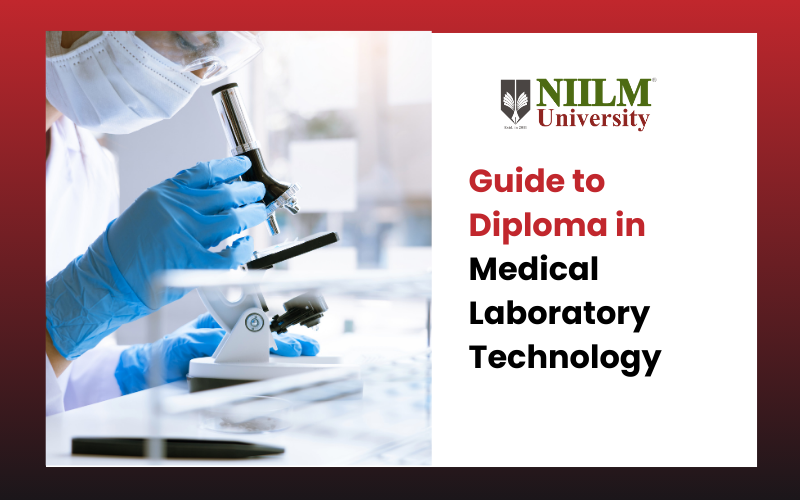Admission Enquiry

A diploma in medical laboratory technology might help you start a career in the field. Seek advice regarding career paths, courses, and admissions.
Medical laboratory technologists play a critical part in the constantly changing healthcare profession. They perform tests that provide vital information for patient diagnosis and treatment; they are the unsung heroes who labor in the background. A Diploma in Medical Laboratory Technology (DMLT) could be the best course of action for you if you're thinking about work in this industry. All the information you require to pursue a DMLT will be covered in this tutorial.
What is a Diploma in Medical Laboratory Technology?
A Diploma in Medical Laboratory Technology (DMLT) is a program designed to train students in the practical and theoretical aspects of laboratory science. A broad range of subjects are covered in this course, including hematology, immunology, microbiology, and clinical biochemistry. A DMLT offers a concentrated and specialized approach to laboratory practices in contrast to other medical qualifications.
Why Choose DMLT?
High Demand: Increasing need for skilled laboratory technologists in healthcare.
Diverse Opportunities: Jobs in hospitals, diagnostic centers, and research labs.
Vital Role: Crucial in providing accurate test results for patient diagnosis and treatment.
Further Education: Foundation for advanced studies in medical laboratory technology.
Admission Requirements
-Completion of higher secondary education (10+2) with a focus on science subjects such as Biology, Chemistry, and Physics.
-An admission exam may be a requirement for some universities.
-An interview to evaluate the applicant's aptitude and enthusiasm for the position.
Course Curriculum in DMLT
Clinical Biochemistry
The study of the body's chemical processes with an emphasis on disease diagnosis through examination of bodily fluids such as blood and urine.
Microbiology
The study of microorganisms and how they cause disease, such as bacteria, viruses, fungus, and parasites.
Hematology
The Study of blood disorders and blood-forming organs. It involves the examination of blood samples for the purpose of diagnosing diseases such as leukemia and anemia.
Immunology
The study of the immune system, including its structure, function, and disorders. It involves understanding how the body defends itself against pathogens.
Histopathology
The Use of a microscope to examine tissues in order to diagnose illnesses. In order to find anomalies, tissue samples are analyzed in this subject.
Cytology
The investigation of cells, with a focus on their composition and operations. It involves analyzing cell samples to find disorders like cancer.
Laboratory Management
Principles of managing a laboratory, including quality control, safety procedures, and administrative tasks.
Skills Acquired
-The capacity to run and maintain lab apparatus.
-Expertise in evaluating and deciphering examination outcomes.
-Ensuring precision and accuracy in all lab operations.
-Spotting and fixing problems in laboratory procedures.
-Transmitting information clearly and working together with medical experts.
Job Opportunities After DMLT
Conclusion
In conclusion, a Diploma in Medical Laboratory Technology opens doors to a rewarding career in the healthcare industry. For individuals who are interested in laboratory science, this program is a great option because it offers extensive training and a variety of employment options. A DMLT gives you the groundwork you need to thrive whether your career goals are to work in a private company, research facility, or hospital.
Frequently Asked Questions (FAQs)
Q1. What qualifications are needed to obtain a Medical Laboratory Technology Diploma?
A1. Normally, you have to have finished high school with science courses like biology, chemistry, and physics in order to be qualified for a DMLT program.
Q2. What is a medical laboratory technician's typical salary?
A2. Medical laboratory technicians can expect to make between $30,000 and $45,000 per year at entry level, with the possibility of earning more with experience and qualifications.
Q3. Can I work part-time toward this diploma?
A3. Indeed, a lot of schools provide online or part-time DMLT programs to suit working people.
Q4. What opportunities for employment exist once this diploma is earned?
A4. With chances in hospitals, research labs, diagnostic centers, and the pharmaceutical business, career prospects for DMLT graduates are great.
Q5. How important is accreditation for this course?
A5. The curriculum must fulfill high criteria of education and training in order to be accredited, which guarantees future employment and professional advancement.
Copyrights © 2024 NIILM UNIVERSITY. All rights reserved.